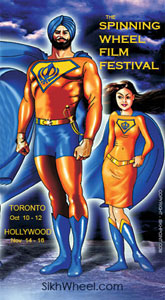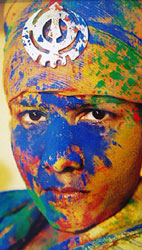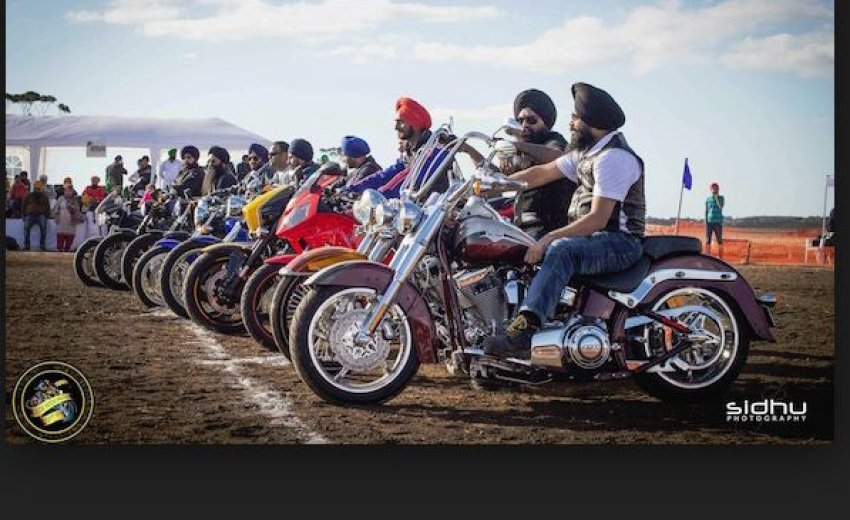Over forty years ago, one of us was on a trip back home in India. He had packed some small gifts that his kin had asked for. Many of them wanted jeans - not just any kind - but specifically, Levis. And they wanted to be certain that the label showed.
Why? Because the visible brand name carries a message. Madison Avenue has conditioned us so. The power of the advertising message rules us so that the brand name makes a powerful statement.
We illustrate the power of the label by a more poignant example.
Almost sixty years ago, one of us wanted to buy a bicycle in Punjab. The dealer had the usual Indian brands, but not the Raleigh or the BSA. The child's mind would not budge. What to do then? The dealer, in an aside, quietly assured the parent that if we selected a bicycle right then, he would deliver it by the next day duly stamped with the desired logo and brand.
Ever notice how our automobiles have become an extension of ourselves? A Lexus speaks of luxury, and even the smallest Mercedes or BMW is a tribute to German engineering. A Hummer, no longer quite as desirable with the current uncontrolled acceleration in gas prices, still personifies brute and raw power. A red Corvette speaks of pure and everlasting romance. Think a moment of the joy of wearing Prada or walking around with a Coach bag with the label prominently visible.
What kind of persons are we? How and on what we spend our money immediately brands and pigeonholes us.
Not so long ago, we were walking away from a day-long conference on our Sikh presence in the diaspora, and it hit us that labels and brands had created and defined their own reality, not just in fashion, but in matters of religion, as well.
 The religious labels that define us, too, create, carry and convey a potent reality. And in the free marketplace of religions, in the smorgasbord of so many faiths of mankind, often the reality they create may have little to do with the truth, but it comes to define us all.
The religious labels that define us, too, create, carry and convey a potent reality. And in the free marketplace of religions, in the smorgasbord of so many faiths of mankind, often the reality they create may have little to do with the truth, but it comes to define us all.
Fundamental behavioural psychology tells us that when the label is flashed across a television screen, for instance, it evokes a predictable response. The brand is so important!
We know that defining what people truly believe, through sound bytes, is a dangerously inadequate pastime, but isn't this how the world works?
In this day and age, what are the first thoughts that come to mind when one mentions Muslims - fundamentalism and fanaticism, terrorism, jihads and suicide bombers!
Palestinians, too, have long had a hopelessly bad rap. The man or woman on the street has long forgotten that a fundamental of Islam is peace and submission to God's Will.
How about Hindus? Innumerable gods and goddesses, sacred cows and the caste system, perhaps also yoga, and vegetarianism! Hinduism has cultivated an image of very great tolerance of diversity. The world no longer notices some very intolerant acts in its name, nor does it much remember the intricate and rich Vedic philosophy.
Think Christians and Christianity and what comes to mind is a progressive, egalitarian society with equal rights for its citizens. One does not think of the long history of crusades, slavery and racial discrimination, or the fact that in the most progressive society of all, the United States - not a Christian country but based on Christian values - women did not get the right to vote until 1920. The ugly colonial history of many Christian societies is no longer remembered, even though it is not in the distant past.
Say the word "Buddhism" and the first response would be how peaceful, non-violent its followers are. A people who are attached to meditation and respect for all life, not just their own - very tolerant of the different beat of the other drummers to which many of us chose to march. Think not of present-day Burma or the Cambodia of Pol Pot as models of Buddhist values. A mention of Jews evokes memories of the Holocaust, but it also reminds us of their immense contribution to a progressive, liberal and tolerant society. One doesn't automatically think of Judaism as the tradition that thinks of itself as the "Chosen People", or the fact that its two offspring - Christianity and Islam - also embraced the concept of exclusivity of dogma.
A mention of Jews evokes memories of the Holocaust, but it also reminds us of their immense contribution to a progressive, liberal and tolerant society. One doesn't automatically think of Judaism as the tradition that thinks of itself as the "Chosen People", or the fact that its two offspring - Christianity and Islam - also embraced the concept of exclusivity of dogma.
We don't mean to provide thumbnail sound bytes of all the ways that humans connect to the ultimate reality, or make their place in this multicultural global village. (They are not necessarily accurate.) Let's jump to our own faith and the sound bytes that define it to the larger non-Sikh society around us.
Say the word "Sikhs" and perhaps the first words that come to the mind are, "Who are they? Are they a sect of Hinduism, or are they Muslims? Aren't they the ones who killed the prime minister of India, Indira Gandhi, a few years back?
To those who get their information from Bollywood movies, Sikhs are reduced to buffoonery and a comedic presence of inane humor.
Almost twenty years ago, an immigration officer at the border asked one of us if he was carrying alcohol. When told that Sikh teaching does not condone the use of alcohol, the officer was astonished. All the Sikhs he had known, he said, drank like a fish and not what the fish drink.
In our experience, largely three themes seem to dominate and define Sikh celebrations: Bhangra music so loud that all conversation is suspended; food, swimming in oil, so spicy that it burns on its way down, and never served before eleven at night; and both accompanied with alcohol flowing as the sixth river of Punjab.
Those who have read some Indian history and delved into British colonial times associate Sikhs with valour. No doubt this is because both Indian history, as well as European sagas of the Second World War, speak glowingly of the valiant Sikhs.
Seventeenth century Mughal accounts of warring with Sikhs speak of a chivalrous, honest and brave people ready to put their heads on the line for a cause. Their foes write of Sikhs as treating their enemy, women and children with kindness, respect and honor.
The British never tired of singing the praises of Sikh courage, loyalty and honor, and dubbed them a martial race; it is a label that has stuck, even though biologically and genetically, the brand makes no sense.
It is then easy to conclude, like many do, that Guru Hargobind and Guru Gobind Singh must have set the message of Guru Nanak on its head. Where Guru Nanak taught peace, the other two Gurus transformed Sikhs into a martial people. This is clearly nonsense, but we save the issue for another day.
So much so, that even today, like the ancient Samurai, we have been branded as a supremely martial people. Say the word "Sikh" and many think reflexively of a brave, honorable fighting person. Yes, we earned the sobriquet with our blood, but does it do us justice? Is that all there is to Sikhi? And, finally, does it still apply?
Brands have meaning that can change dramatically and sometimes quite suddenly.
Remember when we believed that "As goes General Motors, so goes the nation"? Now, the cachet of GM has grossly bottomed and the nation's economy has plummeted south.
Remember that less than sixty years ago, any product bearing the logo "Made in Japan" spoke of shoddy goods or a poor imitation? Now, the best electronics come from Japan, and "Made in Japan" is a badge of honor.
Less than ten years ago, the Korean car was a joke; now it competes well with the best. Even "Wal-Mart" that has, for many years, stood for cheap, poorly-made products, is now lifting itself by its bootstraps.
But then there was the Yugo, a car made in Yugoslavia. It was laughed out of existence and never found a foothold anywhere.
Sikhs have a liberal theology, but why aren't they known for it? Sikhi provides a model of an egalitarian society, free of distinction of caste, color, race, nationality and gender. Sikh doctrine promises women an equal place, though the practice falls far short. It defines a model of the ultimate infinite reality common to all creation, in which no one is denied a life of grace - not those of faith and not those without. Sikhi speaks unendingly of a meditational state of mind in which we can become one with the universal, infinite connectivity that is God.
But that is theory and we never tire of retelling it to ourselves, or anyone else who would lend an ear. But where is the reality? True that most non-Sikhs remain monumentally unaware of the richness of Sikhi.
Until the arrival of Manmohan Singh on the scene as India's savvy Prime Minister, and Montek Singh Ahluwalia as the architect of that country's economic miracle, the worldwide public persona of the Sikh was as a rustic warrior, somehow associated with terrorism, practical but simple-minded. The daily squabbles and battles in Sikh institutions around the globe only lent credence to this stilted view of Sikhs and their religion.
The events of 9/11 will live in infamy for America because the country was caught unprepared, its citadels of power attacked, and so many innocents killed.
But for Sikhs, 9/11 ushered an era in which their patriotism as Americans is daily questioned and they face continual violations of their rights, simply because, to the man in the street, the Sikh turban is easily confused with that worn by Osama bin Laden. To many, a turban has become symbol of backwardness, fundamentalism or terrorism.
It is important to know how we view ourselves; it is equally important to know how others view us. We can always blame others - our enemies or the media. But circling the wagons is not a good tactical or strategic vision or policy. It remains unproductive and contrary to Sikh basics, as well as common sense.
The question here is: do we understand enough of our own beliefs to incorporate them into our lives, so that market perception of the brand would change, and then others would automatically know us as we know ourselves, and want to know more?
When a non-Sikh hears the word "Sikh", what would it take for him or her to associate with it qualities of inclusiveness, kindness, love, peace, service, tolerance and magnanimity, along with love of art, music and culture? In other words, the enjoyment of life for the self and others that remain the hallmarks of Sikh teaching.
Are we going to be the GM on its slide downward or reinvent ourselves as the comeback kids? How do we reclaim what is rightfully ours - our legacy?
August 18, 2008
[email protected]

